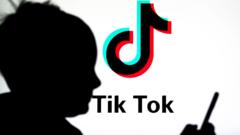Is TikTok Failing to Protect Children's Data? Canadian Officials Weigh In

Published: 2025-09-24 01:50:22 | Category: technology
Recent findings from a Canadian investigation reveal significant shortcomings in TikTok's measures to protect children and their personal data. Despite the platform's stated age restriction of 13 years, hundreds of thousands of Canadian children reportedly use the app annually. The investigation indicates that TikTok has collected sensitive information from many of these young users, which it has leveraged for marketing and content targeting. As scrutiny of TikTok intensifies globally, the Canadian privacy commissioner has highlighted the potential risks associated with the platform's data practices.
Last updated: 04 October 2023 (BST)
Key Takeaways
- Hundreds of thousands of Canadian children use TikTok despite age restrictions.
- The app reportedly collects sensitive personal information from young users.
- TikTok has agreed to improve measures to protect children and clarify data usage.
- The investigation is part of a broader global scrutiny of TikTok's operations.
- Concerns over national security regarding the Chinese ownership of TikTok continue to grow.
The Investigation's Findings
The investigation led by Canada's privacy commissioner, Philippe Dufresne, unveiled alarming insights into TikTok's data collection practices. Children, many of whom are under the age of 13, are using the platform despite its explicit age restrictions. The findings suggest that TikTok collects "vast" amounts of user data, including sensitive information from minors, which is engaged for targeted advertising and content curation.
Mr Dufresne emphasised the potential harm these practices pose to youth, stating that the data collected can influence the content and advertisements they encounter. This raises concerns over the psychological and social implications of targeted marketing directed at children.
Response from TikTok
In light of the investigation, TikTok has publicly committed to enhancing its platform for Canadian users. According to a spokesperson, the company welcomed the scrutiny and expressed a willingness to adopt measures that would strengthen privacy practices. However, TikTok disputed certain findings of the investigation, although it has not publicly clarified which aspects it disagrees with.
The spokesperson reiterated TikTok's dedication to maintaining transparency and upholding robust data protection standards. Yet, the commitment to change comes amid growing global scrutiny and criticism of the platform's operations.
Global Context and Implications
This investigation is part of a wider trend as governments worldwide increase their examination of TikTok’s impact on users and the potential national security risks posed by its Chinese ownership. Similar investigations have been initiated in the United States and the European Union, reflecting rising concerns over data privacy and security.
In the United States, discussions led by former President Donald Trump aimed to reshape TikTok's ownership structure by potentially transferring its US operations to American companies. Such moves highlight the geopolitical implications intertwined with digital platforms owned by foreign entities.
Moreover, in early 2023, the European Commission ordered its staff to remove TikTok from corporate devices, citing data protection and cybersecurity concerns. This action marks a significant step in the European Union's efforts to safeguard user data and enhance cybersecurity measures.
What Are the Risks of TikTok's Data Practices?
As TikTok continues to grow in popularity, particularly among younger users, the risks associated with its data practices cannot be overlooked. The collection of sensitive personal data raises several critical concerns:
- Targeted Advertising: Children may be exposed to ads that are not age-appropriate, potentially affecting their mental health and perceptions.
- Privacy Violations: The breach of privacy for minors can lead to long-term consequences, including identity theft and exploitation.
- Informed Consent: Many young users may not fully understand the implications of their data being collected and used for targeted marketing.
- Cybersecurity Threats: The more data collected, the greater the risk of data breaches, which can expose sensitive information.
What Measures Can Be Implemented for Better Protection?
In response to the investigation's findings, it is essential to consider what measures can be implemented to enhance the protection of children using TikTok:
- Stricter Age Verification: Implement more robust age verification processes to ensure compliance with age restrictions.
- Transparent Data Policies: Clearly outline how user data will be used, and provide parents with information on data collection practices.
- Parental Controls: Develop and promote parental control features that allow guardians to monitor and restrict their children’s usage.
- Educational Resources: Provide resources for both children and parents about online safety and the importance of privacy.
- Regular Audits: Conduct regular audits of data collection practices to ensure compliance with privacy regulations and standards.
Looking Ahead
The future of TikTok and its operations hinges on the platform's ability to navigate the complex landscape of data privacy and security concerns. As investigations continue and public scrutiny intensifies, the company must prioritise user safety, particularly for vulnerable populations such as children. The agreement to enhance protective measures is a step in the right direction, but sustained and actionable changes are essential to rebuild trust with users and regulators alike.
As TikTok grapples with these challenges, its path forward will likely involve balancing user engagement and privacy practices while addressing the pressing concerns of governments and advocacy groups around the world. The implications of these developments will extend beyond TikTok, shaping the future of social media platforms and their responsibilities towards user data protection.
FAQs
What age is TikTok intended for?
TikTok is intended for users aged 13 and above. However, many children under this age reportedly use the app, raising concerns about its safety and data practices.
What sensitive information does TikTok collect from users?
TikTok collects various types of data, including personal information, location data, and behavioural data, which can be used for targeted advertising and content recommendations.
What measures has TikTok agreed to implement following the investigation?
TikTok has agreed to enhance measures to prevent children from using the platform and to clarify how user data is collected and used.
Why are governments scrutinising TikTok?
Governments are scrutinising TikTok due to concerns over data privacy, security risks associated with its Chinese ownership, and the potential impact on young users.
What can parents do to protect their children on TikTok?
Parents can use parental controls, educate their children about online safety, and monitor their usage to help protect them while using the app.


